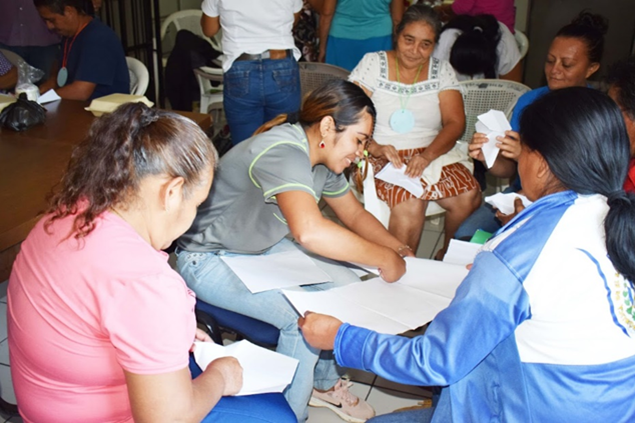Indigenous women leaders address food insecurity through self-advocacy

El Salvador’s indigenous population has long been subject to economic, social, and political exclusions, resulting in large-scale discrimination. Though a national plan focused on bolstering the social and economic inclusion of ethnic groups was developed in 2018, no government action has been taken towards implementation. To empower indigenous leaders to claim their rights and improve their communities, IREX’s partners conducted a series of workshops to support leaders and youth in exercising their rights, protecting their lands and resources, and advocating for aligned policies.
El Salvador’s indigenous population is comprised of more than 110,000 people, or about 10-12% of the entire population as estimated in 2018 by El Sistema de Integración Centro Americana (SICA), a regional organization that collects data to promote integration and sustainable development in Central America. Conversely, official government statistics indicate a mere 0.2% of the El Salvadoran population self-identify as indigenous. As a result of this discrepancy, indigenous people’s needs and priorities have been severely underrepresented and marginalized in policy and advocacy spaces.
Indigenous women leaders, in particular, face extreme marginalization within decision-making practices. With support from a USAID-funded IREX program, a Salvadoran organization and the Salvadoran National Indigenous Coordinating Council (CCNIS) implemented a series of trainings titled “Democratic Culture and Rights” to strengthen Indigenous women’s civic participation and support them in advocating for their communities.
Preparing leaders to advocate for themselves
In four different regions of El Salvador, IREX partners implemented trainings for indigenous members from the Nahua, Lenca, and Kakawira communities, drawing from a specially-designed curriculum and support manual. Enthusiasm to engage on these subjects was clear, with the workshops almost doubling their initial targets of 80 participants to 142 participants.
The workshops provided participants with the knowledge and skills to identify community needs, develop meaningful responses, and advocate their findings and solutions to El Salvador’s decision-makers. Content in the trainings was tailored toward indigenous communities and included modules on democratic culture, rule of law and indigenous rights, citizenship and participation, governance, and tools for indigenous development.
To ensure sustainability and broader reach, participants conducted 20 of their own training  sessions to share their learnings throughout communities in the eastern, western, and central zones of El Salvador. Overall, these trainings reached nearly 600 members of indigenous communities and through this process, participants learned to analyze their community’s needs and propose targeted solutions to decision-makers.
sessions to share their learnings throughout communities in the eastern, western, and central zones of El Salvador. Overall, these trainings reached nearly 600 members of indigenous communities and through this process, participants learned to analyze their community’s needs and propose targeted solutions to decision-makers.
From formulating ideas to taking action: The Kakawira case
The secretary of the Kakawira indigenous organization, who participated in the training, led a working group of indigenous women in conducting a situational analysis and needs assessment in their municipalities of Cacaopera and Corinto. Their assessment found that Kakawira families, who are heavily reliant on agriculture, are facing native seed loss due to rising seed costs – a leading cause of food insecurity in the area. To address this challenge, the working group developed a proposal for a native seed bank to support Kakawira families to plant seeds, ensure food security, and preserve an important part of their identities.
Seed banks conserve a variety of seeds, which help ensure crop variety in the face of crop loss due to climate change and industrial agriculture. The proposed seed bank would help families increase the nutritional value of their daily food supply, make it more accessible, and help the broader community address chronic food security issues by safeguarding seeds. The initiative aims to boost crop production, diversify food sources, and create income through seed sales, thereby enhancing the families' economic well-being.
Putting training into action, the women presented their proposal to Christian Aid, a UK-based international development organization. They successfully obtained the funding needed to develop and launch a seed bank in the municipality of Corinto, Morazán.
After receiving the funding, the group began promoting conservation and seed choice techniques and cultivating the land within their community. They also collaborated with the local government to host a monthly agro-ecological fair to continue to boost the area’s economy. Now, the harvest is plentiful and diverse, and crops are more nutritious and more resilient to drought and other climate pressures.
Civil Society and Media-Strengthened Together and Advancing in New Directions (CSM-STAND), a five-year Leader with Associates Award with Pact as the holder of the leader award and recipient of the Leader Award, and IREX as co-lead and head of the media component. Launched in 2021, the CSM-STAND consortium’s goal is to foster independent civic forces, enhance civic engagement, and build vibrant, resilient, and self-reliant civil society and media sectors that cultivate more pluralistic and democratic societies.